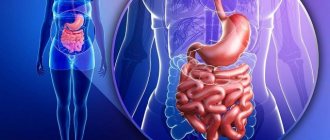Constipation is a condition characterized by excessive straining during bowel movements, a feeling of incomplete bowel movement, difficult and painful passage of hard stool in small portions.
The definition of constipation as a decrease in stool frequency (less than three times a week) is not considered correct today. This is primarily due to individual characteristics: if a person is generally healthy, both daily bowel movements and bowel movements with a frequency of no more than 3 times a week are considered normal. Thus, the American College of Gastroenterology defines constipation based on symptoms, including poor bowel movements, difficult and infrequent passage of stool, and changes in stool consistency (stool that is hard and dry).
Constipation may be accompanied by abdominal cramps and pain, bloating, nausea, fever, and bleeding from the rectum.
Causes of constipation
Constipation most often occurs due to the slow passage of stool through the digestive tract, formed after digestion of food.
The most common causes of constipation include:
- dehydration;
- changes in diet and low physical activity (or lack thereof);
- changing your usual daily routine (travelling, eating, or going to bed at different times);
- stress;
- anal fissure;
- haemorrhoids;
- intestinal strictures;
- rectocele (protrusion of the rectal wall towards the vagina);
- benign and malignant tumors of the rectum and colon (and other tumors of the abdominal organs);
- neurological diseases affecting the functions of the colon and rectum (autonomic neuropathy, multiple sclerosis, Parkinson's disease, stroke);
- anism (disruption of the normal process of relaxation of the pelvic floor muscles);
- irritable bowel syndrome;
- diverticulitis;
- structural abnormalities of the digestive tract (anorectal fistula, intussusception, intestinal malrotation, intestinal obstruction);
- weakening of the pelvic floor muscles;
- diseases of the endocrine system (hypothyroidism, hyperparathyroidism, diabetes mellitus);
- systemic connective tissue diseases (scleroderma, systemic lupus erythematosus);
- pregnancy.
Factors that increase the risk of chronic constipation include: older age, female gender, dehydration, low fiber diet, lack of physical activity, medications (certain blood pressure medications, sedatives, strong pain medications, antidepressants, antacids, antihistamines , anticonvulsants, anti-nausea medications, iron supplements), mental disorders (depression, eating disorders), use of cleansing enemas and laxatives without a doctor’s recommendation.
How does depression develop in stages?
At first, the patient experiences a depressed state, which he himself attributes to fatigue, a hard work week, drinking alcohol and other reasons. At the same time, he wants to retire from others and at the same time is afraid of being left alone.
Then the stage of acceptance occurs: awareness of a dangerous condition occurs, the problem gets worse, the intensity of negative thoughts increases, the body and immune system malfunction.
The third stage - in the absence of adequate therapy, the patient loses control over himself, aggression increases.
When should you see a doctor for constipation?
You should consult a doctor if there are unexplained and persistent changes in bowel movements, blood in the stool, unexplained weight loss, or bowel movements accompanied by severe pain.
The diagnostic search depends on the patient's symptoms, personal history, and general health. The doctor may conduct a physical examination and digital rectal examination, and additionally prescribe laboratory tests aimed at determining the underlying disease, the presence of occult blood in the stool, signs of infection, inflammation, or a malignant process; instrumental studies (radiography of the abdominal cavity, CT, MRI); colonoscopy or sigmoidoscopy; functional tests (defecography, colonic transit study, anorectal manometry, balloon expulsion test).
Treatment of constipation includes changes in diet and lifestyle (increasing fiber and fluid intake, regular exercise); laxatives (stimulating intestinal motility, increasing the volume of intestinal contents and thinning it, helping to soften stool and facilitating its movement); eliminating foods and medications that cause constipation; surgical treatment (for intestinal obstruction, intestinal strictures, anal fissure).
To prevent constipation, you need to eat regularly (stick to a specific schedule), include foods high in fiber in your diet (vegetables, fruits, whole grains, legumes), try not to eat processed foods, reduce your consumption of meat and milk, drink plenty of fluids, exercise regularly, avoid stress, do not ignore the urge to defecate.
About the treatment of severe depression - Doctor of Medical Sciences, Head of the Clinic V.L. Just a minute
“Major depression” most often occurs with recurrent depressive disorder (recurrent depressive disorder) or bipolar affective disorder (manic depression), and is often called “major depressive disorder” in the United States. Neurotic depression can also manifest itself as “severe depression,” but usually within the framework of a mixed anxiety and depressive disorder. “Severe depression” occurs with organic damage to the brain, for example, a tumor of the pineal gland, which produces the hormone melatonin, or with a hormonal disease, for example, the thyroid gland.
The core symptom of “severe depression” is considered to be anhedonia - a condition in which a person does not enjoy what he previously received. “Severe depression” is also manifested by irritability, anxiety, melancholy and apathy, and the older the person, the more melancholy and apathy, the younger - irritability and anxiety.
The following are typical for “severe depression”: self-blame, decreased self-esteem, indecision, feelings of hopelessness and hopelessness, loss of interest in life and thoughts of suicide. The danger of the latter increases with an increase in the level of anxiety and excitement, and the appearance of panic attacks against this background. “Severe depression” is accompanied by disturbances in memory, attention and thinking, the latter becomes inhibited, and it is difficult for a person to gather thoughts and concentrate.
In addition, with severe depression, sleep is disturbed (in 80% of cases there are early awakenings, in 20% there is drowsiness and lethargy during the day; appetite usually decreases, weight falls, and severe constipation appears.
“Severe depression” does not occur very often; usually depressive episodes are moderate in nature, but, unfortunately, they become protracted, especially with improper treatment and in old age.
Despite the prevalence of depression, little is known about it and its dangers are underestimated. Depression is an “invisible disease”, little is talked about, and it is extremely rare to see a doctor. Even in the United States, where psychiatry has long ceased to be something to be ashamed of and has become as commonplace as a visit to the dentist, up to 37% of patients with severe depression do not receive the necessary treatment (Shim, 2011). Our situation is obviously much worse.
Why is depression dangerous?
Depression is associated with an increased risk of cardiovascular disease and disorders of the immune system (higher risk of inflammatory diseases, infectious diseases and cancer). In general, according to the latest data, depression is always accompanied by quite severe inflammation.
As noted earlier, “severe depression” is often accompanied by thoughts of suicide. In fact, there are quite a few reasons for suicide, but not all of them, of course, are associated with “severe depression”; sometimes they occur against the background of alcohol intoxication, in old age, with the loss of a partner with whom a person has lived his entire life, etc.
In the United States, an average of 44 thousand people commit suicide per year. The percentage of suicides in Russia is approximately the same as in the United States. In northern countries there are more suicides than in southern ones; young or old people, especially men, are more likely to commit suicide.
Most suicides could be prevented if the depressed patient or their relatives sought help in a timely manner. Why doesn't this happen? People with severe depression rarely seek help themselves. The future appears to him in a negative light; he does not believe that anyone can help. Even when he has suicidal thoughts, it seems like a natural extension of his depression. The patient rarely talks about suicidal intentions at the moment when they first appeared. Sometimes relatives can find out about a sick person’s thoughts about suicide only through indirect signs - a sudden distribution of personal belongings, a conversation about death, or a search for means for suicide. I note that thoughts of suicide are indications for involuntary hospitalization in a psychiatric clinic.
Relatives often do not notice even very severe depression in loved ones, especially if the sick person spends a lot of time at work or study, or lives alone. Many people hide depression as a sign of trouble and prefer not to talk about their problems.
How can you tell if a loved one is thinking about suicide?
Statements such as “I don’t want to live”, “it will be easier for you without me”, “no one cares whether I live or die” must always be taken seriously. Parents often believe that teenagers manipulate the topic of their death. This does not happen as often as expected, but even with manipulation there is a high risk of “playing too much.”
There is an opinion that those who talk a lot about suicide never actually commit it. It is a myth. Constantly talking about the topic of suicide and especially means of suicide brings the patient closer to action. Relatives, seeing symptoms of depression and a long-term depressed state of the patient, are afraid to directly ask whether he is thinking about suicide. Many people believe that such a question can lead to suicide. This is another myth. It is important to understand what happens to someone with depression and how severe their condition is. An open conversation is the best option to clarify the situation, so psychiatrists often directly ask the patient about the presence of suicidal thoughts, believing that this postpones the possibility of suicide.
Inpatient treatment for severe depression
If your loved one has thoughts of suicide, I recommend emergency hospitalization despite the patient’s refusal. This position may seem like an unnecessary precaution, but I have seen enough cases where the decision to attempt suicide was made almost instantly and was completely unpredictable (the patient’s condition “flickers”). Severe depression is an illness that seriously affects thinking.
As I have written before, if you think that a loved one who is ill is intelligent and in control, you are mistaken. Studies of the brain's response to certain stimuli (cognitive evoked potentials) show that a person with severe depression spends on average 1.5-2 times more time processing information than a healthy person. Depression seriously affects the brain, destroying it, and this impact cannot be underestimated.
On the other hand, medications prescribed for depression, antidepressants, do not begin to act immediately, and in some cases can increase thoughts of suicide, especially when prescribing drugs that selectively affect serotonin, for example, a drug such as Sertraline. Sometimes, with severe depression, the patient does not have the energy and strength to attempt suicide, but when treatment begins and the condition improves slightly, the patient attempts suicide. In my book Depression I write about similar cases.
In general, outpatient treatment for severe depression seems to me to be risky and unjustified. If you do not have the financial ability to treat your loved one in a private clinic, it is better to go to a public hospital, but do not risk trying to be treated at home. For persistent suicidal thoughts, antipsychotics are prescribed, more often Clozapine and even electroconvulsive therapy, which, for example, was the case with the writer Hemingway.
Drugs and TMS in the treatment of depression
For any depression, antidepressants are traditionally prescribed, however, at least 30% of patients with depression do not respond to antidepressants and must be treated with other methods and other drugs, for example, cognitive behavioral psychotherapy, weak currents stimulating certain structures or transcranial magnetic stimulation, mood stabilizers , NMDA receptor blockers, or antipsychotics.
We select a drug based on the severity of the condition, the risk of developing bipolar disorder (drugs that affect only serotonin receptors cause the so-called “phase inversion”, contributing to the appearance of manic states), as well as data from pharmacological genetic analysis. In our clinic, we monitor the level of the drug in the blood to avoid overdose and the development of side effects and the use of low dosages that do not provide the desired therapeutic effect.
In addition to medications, we use the method of transcranial magnetic stimulation (TMS), which is approved for the treatment of depression by the English NICE and the American Psychiatric Association, as well as other methods of physical therapy (nasal electrophoresis, neurobiomodulation, instrumental psychotherapy, etc.)
Psychotherapy in the treatment of depression
Psychotherapy is an important part of treatment for depression. All over the world, the cognitive-behavioral approach is used, which has proven its effectiveness in a lot of research. Unfortunately, there are not many cognitive behavioral therapists in Russia. Psychotherapy for “severe depression,” if conducted by a psychologist, should be under the supervision of the attending physician—a psychiatrist. The duration of psychotherapy varies, usually about 15 to 30 sessions are needed to achieve a lasting result. A larger number of sessions seems pointless and even harmful to me, because... The patient begins to develop a dependence on therapy and on the psychotherapist.
Relapses of depression
If depression is treated incorrectly or incompletely, the disease in most cases returns again, in 50% of cases within 6 months, in 85% of cases within 10 years after the first episode of depression (Forte et al., 2015). These numbers suggest that it is extremely important to properly and completely treat a depressive episode.
The practice of working with depression in the clinic is described in my book “Depression” https://psyclinic-center.ru/biblioteka-kliniki/kniga-depressiya/praktika
How dangerous are antidepressants for the human body?
Are antidepressants dangerous to your health? People are as afraid of these drugs as they are of antibiotics. There are many myths around these medications. How dangerous are antidepressants really? First of all, you should understand that no doctor will prescribe you a potent drug without indications for it.
Modern medicines have a rather gentle effect on the human body, bringing great benefits to patients and bringing them closer to recovery much faster. The drugs affect the production of necessary neurotransmitters and compensate for the lack of serotonin and endorphins. As a result, within a couple of weeks the patient begins to feel many times better than before the start of therapy.
However, the positive effect of the tablets does not occur immediately; over the course of several weeks, the human body adapts, which is why some side effects occur. They often cause patients to stop taking medications because they feel like their condition is only getting worse. However, you should be prepared for the fact that these are not magic pills that will help you get rid of a serious illness overnight. Most medications have a cumulative effect.
A competent specialist knows in what dosages a particular drug should be taken. Most often, the dose is increased gradually, as the body gets used to it, which is why at the beginning of taking it the expected effect will be absent. It is important for patients to stay in touch with their doctor to inform him of any changes. If your health condition worsens, tell your doctor. If you follow the recommendations, the medications will only bring benefits and a significant improvement in your well-being.
Antidepressant addiction – myth or truth?
It is impossible to say unequivocally that drugs for depression are evil. But also the fact that they are absolutely harmless. Medicine does not stand still, just like pharmacology. Medicines are constantly being improved and improved. Today, those medications that caused drug addiction and posed a real threat to health due to side effects are long gone. The latest generation of drugs is much safer than their predecessors.
In some cases, patients have to take medications for years, not because they become dependent, but because the treatment plan and indications require it. However, most often, when contacting specialists at an early stage of the disease, the use of drugs is not required, or a short course of treatment is required. The dosage is gradually reduced, which prevents the development of drug dependence. A person gradually gets used to living without medications.
However, the truth is that while most of these pills are banned from over-the-counter sales, some people circumvent the law and purchase them illegally. Why is this being done? The fact is that some drugs, when overdosed and used for a long time, can still be addictive. Some of the most common over-the-counter drugs include Lyrica and Fluoxetine (Prozac). When used for other purposes, for recreational purposes, the drugs can cause addiction, which can only be gotten rid of with the help of a narcologist.
You should not self-medicate, increase the duration of use and dose, this can lead to undesirable consequences and side effects. If you feel you cannot stop taking the drug, call your doctor. He can help you get rid of your addiction.
Signs of severe depression
During deep depression, a change occurs in the functioning of the brain: the biochemical and physiological processes of nerve cells proceed differently. Brain substances or, as they are also called, “hormones of happiness” - dopamine, serotonin, norepinephrine - are responsible for a person’s mood and activity. If brain activity is impaired, then apathy occurs and a lack of energy occurs. In order to prevent a person from losing interest in life and begin proper treatment on time, you should thoroughly know the manifestations of severe depression.
If a man:
- feels guilty;
- thinking about suicide;
- is in a depressed mood;
- not active and inoperative;
- suffers from low self-esteem;
- can't concentrate;
- sees his future gloomily and pessimistically;
- does not show interest in usual activities, family;
- aggressive;
- sleeps poorly;
- suffers from hallucinations;
- delirious;
- feels chronic pain in different parts of the body;
- significantly loses (and in rare cases gains) weight;
- inhibited or, conversely, excited,
...then there is a high probability that he is deeply depressed. In any case, a psychologist, psychotherapist or psychiatrist makes a diagnosis and prescribes treatment.
You should not assume that the disease will go away on its own; the consequences of severe depression can be very serious. Constant anxiety and fear can eventually turn into manic forms, which is why it is so important to consult a specialist when you notice the first symptoms.
In our distance learning course, it is possible to obtain the profession of a clinical/crisis psychologist and be ready to professionally provide immediate psychotherapeutic support to people in an acute crisis situation and suffering from severe depression.
How can the doctor help?
There is a huge mistrust of doctors in our country. The rather low level of medicine in the regions, lack of funding, low salaries of doctors, and with it a negligent attitude towards work also have an impact. Of course, there are good and bad doctors and clinics; if you do not trust budget institutions, contact a private center.
If you have symptoms of the disorder, you should immediately contact a psychotherapist. A specialist will be able to quickly recognize the disease, carry out diagnostics and take tests, examine the patient and draw up an individual psychopharmacological treatment plan. Clinical psychologists at our center can also make a diagnosis of depressive disorder. Quite often our patients experience alcoholic depression due to prolonged abuse of alcoholic beverages. “Center for Healthy Youth” has all the capabilities, experience and necessary resources to eliminate all symptoms of the disease and normalize the psycho-emotional state of the patient.
Many people are afraid of psychologists. “Am I crazy?” – can often be heard from patients. However, neuroses and depressive states do not mean that a person is mentally ill, and he will be admitted to a mental hospital and registered. When contacting a private center, people are treated completely anonymously. Even if you go to a public clinic, you will not be registered at the dispensary. Specialists do not have the right to disclose the diagnosis or provide information about the patient’s condition to third parties, since this is a medical confidentiality. A person can go through the treatment process completely calmly. Quite often, an experienced doctor will only need to conduct psychotherapy sessions in order to achieve stable remission. Personal communication with a doctor and following his recommendations is all that is needed for a speedy recovery. You should not prescribe medications yourself, it can end badly.
If you feel increasing symptoms of depression, you should not wait for a miracle and live with it for years, there is a way out, modern techniques and the latest drugs will help you cope with the disease. Doctors will help you regain the joy of life even with chronic pathology.
Types of depression
Experts distinguish three types of depression based on severity: mild, moderate and severe. Severe cases can occur with or without psychotic symptoms (delusions, hallucinations, obsessive thoughts). It is necessary to be able to distinguish a difficult stage from others in order to know exactly what methods will have to be used to help a person in a difficult situation.
In a state of mild or moderate depression, the patient usually continues to go to work and communicate with people, although his quality of life is significantly reduced. In a severe form, a person is in a bad mood, does not feel interest in what is happening and does not enjoy his activities, he quickly gets tired, suffers from bouts of crying or aggression, and in some cases may even think about suicide as the only way out of this state.
Diagnosis and treatment of depression
—
To identify the disease, experienced specialists use short questionnaires - screening tools to identify symptoms: anxiety, anhedonia (loss of pleasure in life), suicidal tendencies. Thanks to this, it is possible to determine whether the patient has chronic depression, symptoms and methods of treating depression, what form it is and its severity.
To fully understand the picture of the disease, the doctor needs to become familiar with the symptoms that indicate depression, and not another psychological disorder.
To treat depression, you can contact the following specialists:
- Psychiatrist - treatment of depression with hypnosis, medications for acute mental pathologies - schizophrenia, mental retardation, epilepsy, as well as other less severe illnesses - neuroses, depression, alcoholism, drug addiction, etc.
- Psychotherapist - treatment is carried out through special therapy, which involves explanations, conversations, and searching for solutions to problems together with the patient.
- Psychologist – advises the patient, cannot prescribe medications or examinations. Clinical psychologists use modern testing methods to identify problems that cause psychological disorder.
The main directions of therapy in treatment are psychotherapy, pharmacotherapy, social therapy.
Cooperation and trust in the doctor are noted as a necessary condition for the effectiveness of treatment. It is important to strictly follow the prescribed treatment regimen, visit your doctor regularly, and give a detailed report of your condition.







